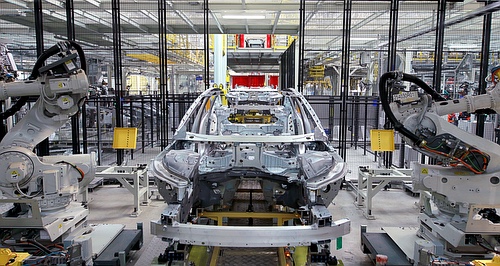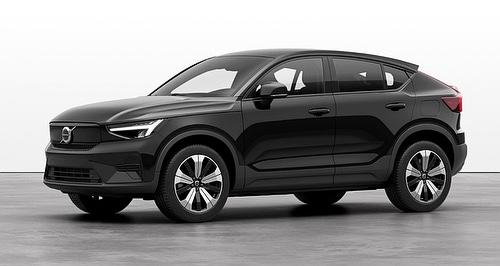News - VolvoVolvo to sell 20,000 BEVs annually by 2026BRIGHT FUTURE: In Australia’s premium BEV market, Volvo currently ranks third behind Tesla with its XC40 Recharge. Shift in consumer sentiment, supply surety buoy Volvo’s confidence in electric switch3 Nov 2022 By MATT BROGAN VOLVO Car Australia – which this week announced that it would sell only battery electric vehciles (BEV) locally by 2026 – says it can sell up to 20,000 units annually within three years, giving it a two per cent share of the local market.
In Australia’s premium BEV market, Volvo currently ranks third behind Tesla with its XC40 Recharge, and with more production assured for 2023 and beyond, Volvo Car Australia (VCA) managing director Stephen Connor says the company is set to build steadily upon that success.
Speaking to journalists gathered for the recent launch of the C40 Recharge electric crossover, Mr Connor outlined VCA’s plans to achieve a three-fold advance in BEV sales over the next three years, saying current numbers indicate Australian consumers are ready to make the switch to electric vehicles.
“This year, if you look at the BEV market alone, we are number three in the BEV market for premium (cars). Tesla are top-two, we’re next and Polestar are either one or two (places) behind us. The only other volume brand to match those numbers is Hyundai,” he said.
“If we had all the production we had asked for this year, we would have delivered close to 1500 (electric) XC40s.”
That figure places Volvo in an enviable position. Year-to-date figures show Tesla has sold 14,023 electric vehicles against Volvo’s total number of 8131 – which includes petrol and hybrid models.
Optimistically, Mr Connor said the numbers were a positive sign and that with production allocation for 2023 offering “strong supply” of all-electric C40 Recharge and XC40 Recharge models – the latter of which is slated to become VCA’s best-selling vehicle – means Volvo can maintain its foothold against Tesla in this country.
“Next year, we have 1550 assigned to our production plan – that’s C40 Recharge – and our production plan for XC40 Recharge is 3450 (units). Across mild hybrid and pure-electric we’re looking at about 7250,” he said.
“While we’ve had (production) cuts this year, the way that it works is that the company will try to fit it within the cycle plan for the year. Those numbers are locked in as of today ... We absolutely get our fair share of production, and we’ve been working really hard to make sure that it happens.
“We will still grow by 30 per cent this year, and we’re planning to grow by another 20 per cent next year. The growth for us will come mainly from pure electric.”
Mr Connor said the Australian consumer has changed, and that the shift in mindset is integral to VCA meeting its targets.
“The Australian consumer is ready for the challenge. I mean, Tesla will sell over 20,000 cars this year. That fact in itself is telling you that people aren’t waiting for the government to come out with subsidies – and I don’t think we are in Australia – they’re not waiting for that.
“I think people want to see the revolution. I think people want to see new cars coming through. And we plan our cycle almost six months in advance, so right now we’re in production for MY24.
“But it comes back to that fact that we’re a very good importer market for Volvo global – they’re impressed with what we’re doing, and they’re impressed with consumer demand.
“They’re working very hard to prioritise customer orders, because they know we’ve got orders in the bank and customers waiting for their cars. So naturally they will try and divert as much production as possible to satisfy our customers.”
When asked just how the numbers would stack up over the next five years, Mr Connor said he was confident VCA could sell 20,000 units annually, giving the importer a two per cent share of the Australian market.
“I’m planning that in 2026 we will sell 20,000 units – two per cent market share – and be fully electric,” he said.
“To put that in context, and if we had got the production, we could have sold around 14,500 cars this year. So, the growth, when you put it in that context, isn't huge.
“What is huge is that we’re going from our Recharge (BEV) share being about 30 per cent, roughly, to full electric by 2026. That’s the transition.
“By about 2025, our fully electric share will already be about 78 per cent of our volume, so what I’m really doing is converting that last 22 per cent to being fully electric by 2026 – and it will really only be product availability that will slow us down.”
Mr Connor said that based upon existing sentiment, he expects consumers to be even more determined to make the switch to electric vehicles within the coming years, saying most would not wait until the end of the decade to replace their ICE-powered cars.
“I’m expecting acceleration in consumer sentiment, I think it will grow considerably,” he added.
“But I also think the brand has underperformed here in the past few years and that we’re now heading towards where the brand deserves to be.”  Read more3rd of November 2022  Volvo to go all BEV in Oz from 2026Local importer beats head office to the all-electric punch by four full years26th of October 2022  2022 Volvo C40 Recharge Pure Electric ReviewVolvo’s second pure-electric model has arrived with up to 300kW of emissions free power |
Click to shareVolvo articlesResearch Volvo Motor industry news |
















Facebook Twitter Instagram